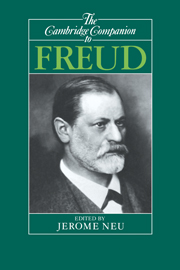Book contents
- Frontmatter
- Introduction
- 1 Freud: The psychoarcheology of civilizations
- 2 Seduced and abandoned: The rise and fall of Freud's seduction theory
- 3 Freud's androids
- 4 The interpretation of dreams
- 5 The unconscious
- 6 The development and vicissitudes of Freud's ideas on the Oedipus complex
- 7 Freud and perversion
- 8 Morality and the internalized other
- 9 Freud on women
- 10 Freud and the understanding of art
- 11 Freud's anthropology A reading of the “cultural books”
- 12 Freud's later theory of civilization
- 13 In fairness to Freud: A critical notice of The Foundations of Psychoanalysis, by Adolf Grünbaum
- Bibliography
- Cited works of Freud
- Index
- Series list
10 - Freud and the understanding of art
Published online by Cambridge University Press: 28 May 2006
- Frontmatter
- Introduction
- 1 Freud: The psychoarcheology of civilizations
- 2 Seduced and abandoned: The rise and fall of Freud's seduction theory
- 3 Freud's androids
- 4 The interpretation of dreams
- 5 The unconscious
- 6 The development and vicissitudes of Freud's ideas on the Oedipus complex
- 7 Freud and perversion
- 8 Morality and the internalized other
- 9 Freud on women
- 10 Freud and the understanding of art
- 11 Freud's anthropology A reading of the “cultural books”
- 12 Freud's later theory of civilization
- 13 In fairness to Freud: A critical notice of The Foundations of Psychoanalysis, by Adolf Grünbaum
- Bibliography
- Cited works of Freud
- Index
- Series list
Summary
Freud opens his ingenious and revealing essay on the Moses of Michelangelo with a disclaimer. He had, he said, no more than a layman's or amateur's knowledge of art: neither in his attitude to art nor in the way in which he experienced its attractions was he a connoisseur. He goes on:
Nevertheless, works of art do exercise a powerful effect on me, especially those of literature and sculpture, less often of painting. This has occasioned me, when I have been contemplating such things, to spend a long time before them trying to apprehend them in my own way, i.e., to explain to myself what their effect is due to. Wherever I cannot do this, as for instance with music, I am almost incapable of obtaining any pleasure. Some rationalistic, or perhaps analytic, turn of mind in me rebels against being moved by a thing without knowing why I am thus affected and what it is that affects me.
(1914b, XIII, 211)And then, as if for a moment conscious that he might appear to be imposing his own personal peculiarities, a quirk of his own temperament, upon a subject with its own code, with its own imperatives, he hastens to concede what he calls "the apparently paradoxical fact" that "precisely some of the grandest and most overwhelming creations of art are still unsolved riddles to our understanding." Before these works we feel admiration, awe-and bewilderment. "Possibly," Freud goes on with that irony which he permitted himself in talking of established ways of thinking
Some writer on aesthetics has discovered that this state of intellectual bewilderment is a necessary condition when a work of art is to achieve its greatest effects. It would be only with the greatest reluctance that I could bring myself to believe in any such necessity.
(1914b, XIII, 211-12)- Type
- Chapter
- Information
- The Cambridge Companion to Freud , pp. 249 - 266Publisher: Cambridge University PressPrint publication year: 1991
- 2
- Cited by

